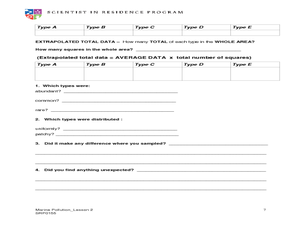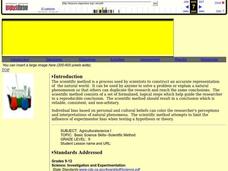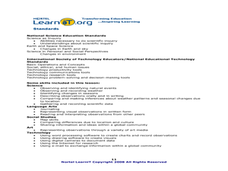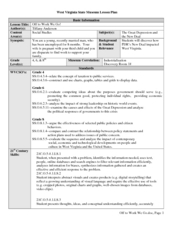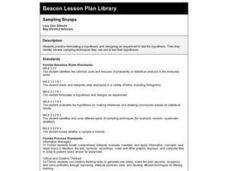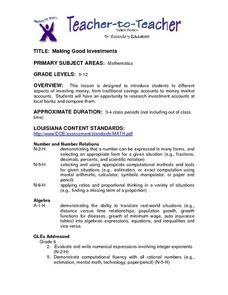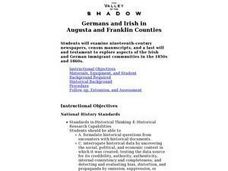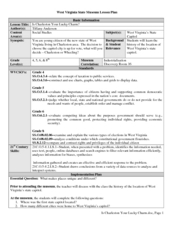Curated OER
Scientific Sampling
Students take a sample of fish and try to determine how many fish are in the sea. In this scientific sampling lesson, students explore the way scientists measure large areas of samples. Students record the distribution in a quadrant.
Curated OER
Scientific Method
Students explore how to use the scientific method to solve problems. For this scientific lesson students define terms, apply the method to problems and search the internet and find sites that cover the scientific method.
Curated OER
Important Contributions to American Culture
Fifth graders explore the contributions of different cultures to the American landscape. Students work in groups and use a variety of resources to create a presentation about a group that emigrated to America.
Curated OER
Students Press Law and Ethics
Students research the rights and the responsibilities of journalists in dealing with First Amendment issues. In this First Amendment lesson plan, students research the Alien and Sedition Acts and study the five elements of...
Curated OER
Web of Deceit
Check the validity of Internet web sites analyzing the accuracy of the information. Students will use this knowledge to create their own web site about a person of their choosing.
Curated OER
Off to Work We Go!
Students create a book about The Great Depression in West Virginia. In this West Virginia history lesson, students visit the West Virginia State Museum, answer questions about West Virginia history, and create a book entitled...
Curated OER
The Seasonal Round and The Cycle of Life
Fourth graders are introduced to the concept of the seasonal round and how folklife traditions vary from season to season. They begin charting dates of personal interest on seasonal round calendars by starting with birthdays. Students...
Curated OER
Sampling Snoops
Students practice formulating a hypothesis and designing an experiment to test the hypothesis. They identify several sampling techniques they can use to test their hypotheses.
Curated OER
Respiratory System
Students identify the parts of the respiratory system and how they interact. They define vocabulary words and draw an outline of themselves and label the parts of the respiratory system. They distinguish between healthy and unhealthy...
Curated OER
Clues to Copying the Code
In this DNA instructional activity, students access a website to determine the information that was used to understand DNA replication. Students compare the difference between observations and opinions. This instructional activity has 7...
Curated OER
Making Good Investments
High schoolers compare different aspects of investing money from traditional savings accounts to money market accounts. They research investment accounts at local banks and compare them.
Curated OER
Ecology and the Conservation of Natural Resources
Students examine the components of ecosystems. They compare and contrast an ecosystem to an aquatic ecosystem. They examine a local ecosystem and discuss its components.
Curated OER
What Happened to Slaves When their Owners Died?
Pupils analyze last and testaments of former slaveowners to identify and explain economic, social and cultural differences between the North and the South leading up to the Civil War.
Curated OER
Unionism versus Secessionism in Virginia
Eleventh graders, in groups, analyze newspaper articles and then debate and discuss if Virginia should succeed from the Union or not.
Curated OER
Germans and Irish in Augusta and Franklin Counties
Students examine 19th century newspapers, a last and testament, and census manuscripts to analyze the Irish and German immigrant communities in the 1850s and 1860s. They write a letter from the perspective of an Irish or German immigrant.
Curated OER
A MATTER OF PERSPECTIVE: COLUMBUS IN THE NEW WORLD
Eighth graders study the famous explorer Christopher Columbus. In this World History instructional activity, 8th graders analyze and compare primary and secondary sources. Students discuss as a class the accomplishments of...
Curated OER
Propaganda During World War I
Eighth graders consider how propaganda was used during World War I. In this World War I lesson plan, 8th graders analyze posters that were used to garner support for World War I. Students use the provided worksheet to...
Curated OER
Heredity, Genetics, Traits
Eighth graders study how an embryo develops into a fetus by undergoing many physical changes which they observe on a poster. They examine the metamorphosis of fruit flies as they develop through a series of changes. They record the...
Curated OER
Suspect Sources at the Republican Debate
Students explore and analyze statements made during a televised presidential debate. In groups, they research and test the validity of the statements made by the presidential contenders. Students examine sources and draw conclusions on...
Curated OER
Algebra 2/Trigonometry Regents Exam
Learners review for the Regents Exam. In this math lesson, students review core concept for the Regents exam by working a variety of problems. A printable worksheet is provided.
Curated OER
Algebra 2/Trigonometry Regents Exam
Twelfth graders test their knowledge of Algebra II and Trigonometry. In this Algebra II/Trigonometry lesson, 12th graders are provided with a copy of an Algebra II/Trigonometry Regent Exam from the fall of 2009. The exam has...
Curated OER
Is Charleston Your Lucky Charm?
Students determine what makes Charleston, West Virginia unique. In this West Virginia history lesson, students explore the West Virginia History Museum to identify why Charleston became the capitol of the state.
Curated OER
Science Processes
Fifth graders observe a dry piece of bread and a damp piece of bread in two separate sealed bags that have been sitting for several days that have been labeled. The observe the mold with a hand lens and record findings in their science...
Curated OER
The Rock Cycle
Third graders study the 3 main types of rocks: igneous, sedimentary, metamorphic. They examine samples of these types of rocks and discuss ways to tell what kind of rock each is. They take notes and draw pictures in their science...


